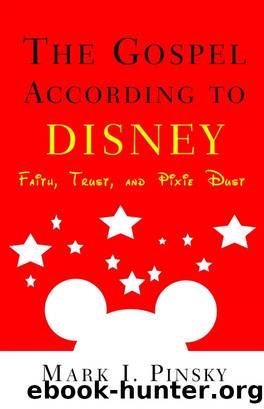The Gospel According to Disney: Faith, Trust, and Pixie Dust by Mark Pinsky

Author:Mark Pinsky
Language: eng
Format: epub
Tags: popular culture, disney, walt disney, animation, dreamworks
Publisher: Mark Pinsky
Chapter Twenty-Three: Aladdin (1992): Encountering Islam
For many Muslims in the United States and around the world, a single, offensive line of dialogue in Aladdin quickly obscured the hit movie’s moral messages. The singer, in the film’s opening song, which has an exotic, Eastern melody, says he comes from a distant land “where they cut off your ear if they don’t like your face; it’s barbaric, but, hey, it’s home.” Clearly, this is the mysterious, Oriental “other,” and such a blanket characterization of a region and a culture smacks of ignorant ethnocentrism. There were early warning signs over the line. Howard Ashman, one of the songwriters, was “not unaware of the racist implication of the lyrics,” and submitted an alternative lyric, which was later used in video and DVD release, according to Henry A. Giroux in The Mouse That Roared. John Culhane of New York University, who wrote a book about the film, Aladdin: The Making of an Animated Film, said he also objected to the line when he screened an early cut, and was surprised when it was not taken out. “I never thought that would stay in the film,” he told Michael Precker of the Dallas Morning News on July 12, 1993. “If Aladdin makes one child slink out of the theater because he doesn’t feel as good about himself as the other kids, then they’ve forgotten what Walt Disney was all about.” During production, Jeffrey Katzenberg was concerned that a sequence involving a campy bit with the genie might be offensive to gays, according to Disney executive Thomas Schumacher, who is openly gay. “Jeffrey asked if those [scenes] offended me—which might surprise people, because apparently we weren’t worried about offending Arabs,” he told the authors of Disney: The Mouse Betrayed.
Disney reacted to the ensuing controversy as most corporations do: first by dismissing the criticism until the complaints gained sufficient traction, and then backing down as little as possible. A studio spokesman rejected the initial complaints as nit-picking. But when the storm of protest from Arab American and Muslim American groups did not subside, and gained support in the media, Disney apologized. “In no way would we ever do something that would be insensitive to anyone,” Dick Cook, then Disney’s vice president for distribution, told Precker in a subsequent Dallas Morning News article (October 22, 1994). “So, on reflection, we changed it.” The line in the video version (and subsequent theatrical releases, but not on the music CD) of the feature became: “It’s flat and immense, and the heat is intense; it’s barbaric, but, hey, it’s home.” For the New York Times, the change was “progress, but still unacceptable,” the paper wrote in a July 14, 1993, editorial. “To characterize an entire region with this sort of tongue-in-cheek bigotry, especially in a movie aimed at children, borders on barbaric.” In any event, the fray demonstrated that the era of the acceptance of offhand stereotypes that stretched back decades was finally over.
Lost, to some degree, in the controversy over that
Download
This site does not store any files on its server. We only index and link to content provided by other sites. Please contact the content providers to delete copyright contents if any and email us, we'll remove relevant links or contents immediately.
The 5 Love Languages: The Secret to Love That Lasts by Gary Chapman(8492)
The Space Between by Michelle L. Teichman(6085)
Assassin’s Fate by Robin Hobb(5236)
Wiseguy by Nicholas Pileggi(4585)
Everything Happens for a Reason by Kate Bowler(4067)
Gerald's Game by Stephen King(3917)
A Simplified Life by Emily Ley(3567)
The Power of Positive Thinking by Norman Vincent Peale(3446)
Pillow Thoughts by Courtney Peppernell(3393)
Resisting Happiness by Matthew Kelly(2885)
Girl, Wash Your Face by Rachel Hollis(2819)
Being Aware of Being Aware by Rupert Spira(2704)
Name Book, The: Over 10,000 Names--Their Meanings, Origins, and Spiritual Significance by Astoria Dorothy(2490)
Real Sex by Lauren F. Winner(2474)
More Language of Letting Go: 366 New Daily Meditations by Melody Beattie(2442)
The Holy Spirit by Billy Graham(2413)
Fast Facts on Defending Your Faith by John Ankerberg & John Weldon(2387)
Victory over the Darkness by Neil T. Anderson(2384)
The Secret Power of Speaking God's Word by Joyce Meyer(2251)
